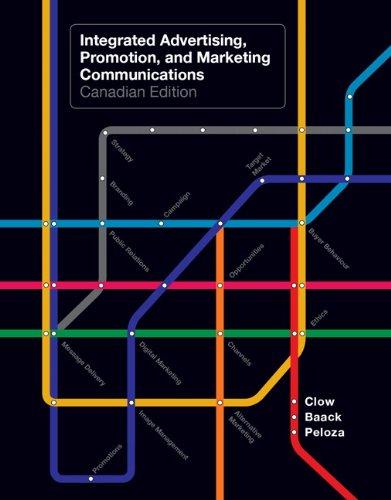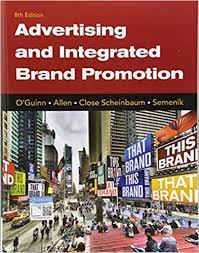Description
Test Bank For Integrated Advertising Promotion And Marketing Communications 1st Canadian Edition By Clow
Clow/Baack/Peloza, Integrated Advertising, Promotion, and Marketing Communications, 1/c/e
Chapter 1 Integrated Marketing Communications
1) Marketing communications agency professionals typically work on many different clients at the same time.
a. True
b. False
Answer: a
Diff: 1
Type: TF
Page Reference: 3
Skill: Concept
Objective: 1-1
2) Most internships in marketing communications are paid positions.
a. True
b. False
Answer: b
Diff: 2
Type: TF
Page Reference: 3
Skill: Concept
Objective: 1-1
3) The push for accountability is being driven by chief executive officers, brand managers, creatives, and account managers.
a. True
b. False
Answer: b
Diff: 1
Type: TF
Page Reference: 7
Skill: Concept
Objective: 1-1
4) Technology has spawned literally millions of new media that have been enthusiastically embraced by consumers.
a. True
b. False
Answer: a
Diff: 1
Type: TF
Page Reference: 8
Skill: Concept
Objective: 1-1
5) In the current competitive environment, tangible differences between brands have become larger over time.
a. True
b. False
Answer: b
Diff: 1
Type: TF
Page Reference: 9
Skill: Concept
Objective: 1-1
6) Brand parity is the result of consumers believing that most brands offer the same set of attributes.
a. True
b. False
Answer: a
Diff: 1
Type: TF
Page Reference: 9
Skill: Concept
Objective: 1-1
7) Advertising that is disconnected with other elements, such as sales promotion, is much less effective.
a. True
b. False
Answer: a
Diff: 2
Type: TF
Page Reference: 9
Skill: Concept
Objective: 1-1
8) Companies are adding expenditures or shifting them from more traditional media to nontraditional or alternative media.
a. True
b. False
Answer: a
Diff: 2
Type: TF
Page Reference: 8
Skill: Concept
Objective: 1-1
9) Brand loyalty has experienced a steady decline.
a. True
b. False
Answer: a
Diff: 3
Type: TF
Page Reference: 9
Skill: Application
Objective: 1-1
10) Communication is defined as transmitting, receiving, and processing information.
a. True
b. False
Answer: a
Diff: 1
Type: TF
Page Reference: 4
Skill: Concept
Objective: 1-2
11) Companies that use advertisements to send messages to customers are the senders in a communications model.
a. True
b. False
Answer: a
Diff: 1
Type: TF
Page Reference: 4
Skill: Concept
Objective: 1-2
12) Taking the central message from the marketing strategy and turning it into some form of communication is called encoding.
a. True
b. False
Answer: a
Diff: 2
Type: TF
Page Reference: 4
Skill: Concept
Objective: 1-2
13) Television commercials and banner ads made from a central message from the marketing strategy are examples of encoding.
a. True
b. False
Answer: a
Diff: 3
Type: TF
Page Reference: 4
Skill: Application
Objective: 1-2
14) Televisions sets and billboards are examples of senders in the communication process.
a. True
b. False
Answer: b
Diff: 3
Type: TF
Page Reference: 4
Skill: Application
Objective: 1-2
15) Decoding occurs when the message is interpreted by the receiver.
a. True
b. False
Answer: a
Diff: 1
Type: TF
Page Reference: 5
Skill: Concept
Objective: 1-2





Be the first to review “Test Bank For Integrated Advertising Promotion And Marketing Communications 1st Canadian Edition By Clow”